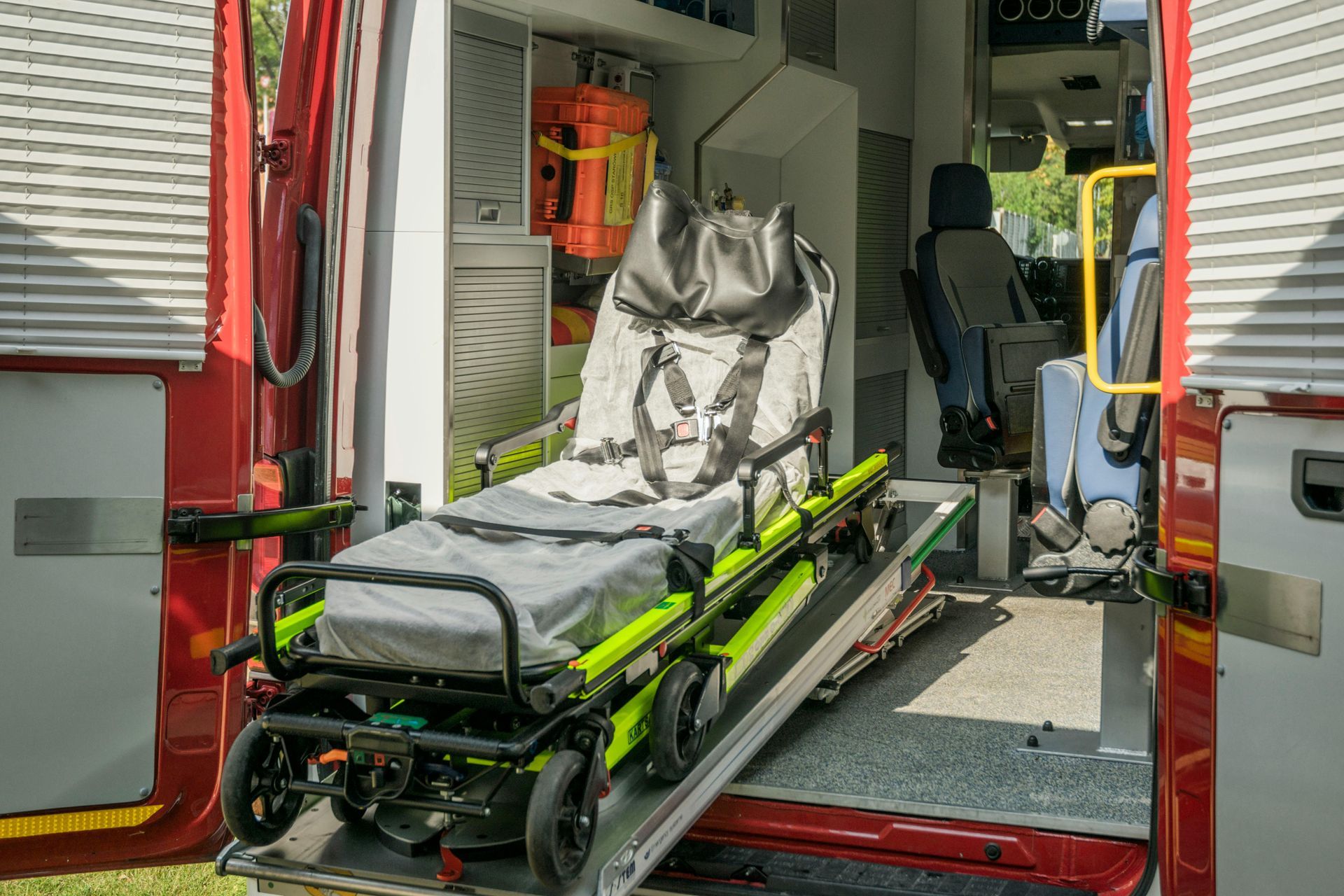Long Distance Medical Transportation on the East Coast
Long distance medical transportation plays a vital role in today's healthcare system by providing access to specialized medical care for patients with chronic diseases or disabilities. These services ensure timely transportation to medical appointments, surgical procedures, or long-term treatments, ultimately improving health outcomes and saving lives.

What Long Distance Medical Transportation
options for the East Coast?
The Why?
A. Importance of long distance medical transportation
Long distance medical transportation is essential for patients who require specialized medical care that may not be available locally, need to be admitted in an another State, or locating near their family . It helps them access the necessary treatments and services that can significantly impact their health outcomes. By providing timely medical transportation, it ensures that patients receive the care they need when they need it the most.
Who Can Benefit From Long Distance Medical Transportation?
- Patients with chronic diseases or disabilities often require specialized care that may not be available in their local area. Long distance medical transportation bridges this gap by allowing them to reach medical facilities that offer the required treatments.
- Access to specialized medical care can make a significant difference in a patient's health outcomes. It can provide them with access to advanced diagnostic tools, cutting-edge treatments, and experienced specialists who can offer tailored care.
- Long distance medical transportation plays a crucial role in saving lives. For patients with life-threatening conditions, timely transportation to medical facilities can be the difference between life and death.
- These services can bring families closer together, especially in situations where the patient cannot be relocated due to their medical conditions. Medical transportation can facilitate the process, providing safe and comfortable travel options for these families.
- A patient may need to be admitted to a new facility or location where other forms of transportation are not possible. Medical transportation can make this feasible by tailoring the services to fit the patient's specific needs.
B. Key challenges faced by patients and their families
Patients and their families face several challenges when it comes to long-distance medical transportation. These challenges can add to the already existing stress and anxiety related to the patient's health condition. Some of the key challenges include:
- Coordinating schedules: Long distance medical transportation often requires careful coordination of schedules between the patient, their family, and the medical facility. This can be challenging, especially when multiple appointments or treatments are involved. It can be challenging when transportation needs to come in from another state to initiate the process and commence long-distance procedures.
- Managing costs: Long distance transportation can be expensive, particularly when considering factors such as fuel costs, accommodation, and meals during the journey. Patients and their families must navigate these costs, which can sometimes create financial burdens.
- Ensuring comfort and safety during travel: Long distance travel can be physically and emotionally draining for patients, especially those with chronic illnesses or disabilities. It is crucial to ensure that the transportation service provides a comfortable and safe environment for the patient, addressing their specific needs and concerns.
- Accessing the right medical facilities or specialists: Patients often need to reach medical facilities or specialists that are not available in their local area. Finding the right medical facility or specialist on the East Coast can be overwhelming, and patients may require assistance in navigating this process. Once the facility is determined, the long-distance medical transportation can begin its process, completing discharge and admissions for the patient. This provides ease for family members, knowing that their family is taken care of and has safely arrived at their destination.
C. Overview of the East Coast as a major hub for medical transportation
The East Coast of the United States serves as a major hub for long distance medical transportation due to its dense population and proximity to renowned medical facilities. It offers a wide range of services that cater to different patient needs and circumstances. This makes it a great option for patients to be able to find a medical facility that meets their medical and condition needs and know that they have transportation that can accommodate these services.
- The East Coast is home to numerous renowned medical facilities, including hospitals, clinics, and research institutions. These institutions attract patients from all over the country who require specialized care.
- The dense population on the East Coast creates a demand for various medical transportation services. This demand has led to the development of a robust network of transportation providers that cater to the unique needs of patients in the region.
- The East Coast's geographical location allows for efficient transportation options, including ground transportation, air medical transportation, and non-emergency medical transport. This variety of options ensures that patients can choose the most suitable mode of transportation based on their specific needs and circumstances.
Uniquehands NEMT Services can play a major role in medical transportation in East Coast areas, including Delaware, Florida, Georgia, Maine, Maryland, Massachusetts, New Jersey, New York, North Carolina, South Carolina, and Virginia.
II. Understanding Long Distance Medical Transportation
To fully understand long distance medical transportation, it is crucial to explore its definition, purpose, and the different options available to patients.
A. Definition and purpose of long distance medical transportation
Long distance medical transportation refers to the services that transport patients over long distances, typically exceeding 150 miles, to access necessary medical care. The primary purpose of these services is to ensure that patients can safely and comfortably reach their medical appointments or treatments, regardless of their location.
- Long distance medical transportation fills the gap for patients who cannot access necessary medical care in their local area. It allows them to travel significant distances to reach the medical facilities that offer the treatments they need.
- The purpose of long distance medical transportation is to ensure that patients receive timely medical care. It helps overcome geographical barriers and ensures that patients can access specialized treatments, surgeries, or consultations without delay.
B. Types of medical transportation options available
Long distance medical transportation offers various options to cater to different patient needs and circumstances. These options include:
1. Ambulance services
Ambulance services provide emergency transportation for patients who require immediate medical attention. These services are equipped with life-saving equipment and staffed by trained medical professionals who can provide on-the-spot treatment. Ambulance services are essential for critical situations where time is of the essence, and immediate medical intervention is necessary.
- Ambulance services are equipped to handle emergencies and provide immediate medical attention during transportation. They are equipped with advanced medical equipment and staffed with paramedics or emergency medical technicians who can administer life-saving treatments.
- Ambulance services ensure a high level of medical care during transportation. The presence of trained medical professionals allows for continuous monitoring of the patient's condition and immediate response to any medical emergencies that may arise during the journey.
2. Air medical transportation
Air medical transportation is reserved for critical situations where time and specialized care are crucial. It includes services such as air ambulances, medical escorts on commercial flights, and international repatriation. Air medical transportation provides rapid transportation for patients who require urgent medical interventions or need to cover long distances efficiently.
- Air medical transportation is ideal for patients who require immediate transportation over long distances. It allows for rapid travel, reducing the time it takes to reach the necessary medical facilities.
- Air ambulances are equipped with specialized medical equipment and staffed with trained medical professionals who can provide critical care during the flight. This ensures that patients receive the necessary medical attention throughout the journey.
- Medical escorts on commercial flights provide a cost-effective option for patients who are stable enough to travel on commercial airlines but require medical supervision and assistance during the journey.
- International repatriation services facilitate the transportation of patients from one country to another, ensuring that they can access the necessary medical care regardless of their location.
3. Non-emergency medical transport (NEMT) services
Non-emergency medical transport services are designed for situations in which patients require assistance to reach medical appointments or treatments, need to be relocated to a new state, but do not have emergencies. These services cater to individuals with mobility issues, elderly patients, or those who lack access to transportation.
- Non-emergency medical transport services provide a comfortable and safe means of transportation for patients who do not require emergency medical care. They are particularly beneficial for individuals with mobility issues who may find it challenging to travel independently.
- NEMT services often include specialized vehicles that are equipped to accommodate patients with specific medical needs. These vehicles may be wheelchair-accessible, stretcher, have oxygen support, or provide other necessary medical equipment.
- NEMT services ensure that patients can reach their medical appointments or treatments on time, admitted, or transferred safely reducing the risk of missed or delayed care. These services offer peace of mind to patients and their families, knowing that reliable transportation is available for their medical needs.
C. Factors to consider when choosing the right transportation option
Choosing the right medical transportation option depends on several factors that need to be carefully considered. These factors include the patient's medical condition, the distance to the medical facility, the urgency of the situation, and the cost of the service. It is also important to consider the reliability and safety record of the service provider.
- The patient's medical condition is a crucial factor in determining the appropriate transportation option. For patients in critical condition or requiring continuous medical care, air medical transportation or ambulance services may be necessary. On the other hand, patients with non-emergency medical needs may opt for non-emergency medical transport services.
- The distance to the medical facility plays a role in selecting the transportation option. Longer distances may require faster modes of transportation and medical escorts throughout the journey to reduce risk, increase patient satisfaction, and enhance safety.
- The urgency of the situation should be considered when choosing the transportation option. For emergency situations, ambulance services or air ambulances provide the necessary immediate response. In non-emergency situations, non-emergency medical transport services can be a suitable choice.
- Cost is an important factor to consider, as long distance medical transportation can be expensive. Patients and their families should assess their budget and explore options that offer the necessary level of care at a reasonable cost.
- Reliability and safety are paramount when selecting a transportation service provider. It is crucial to research and choose a reputable provider with a proven track record of safe and reliable transportation.
By considering these factors, patients and their families can make informed decisions when choosing the right transportation option for their specific needs.
FAQ
Q1: Why is long distance medical transportation important?
A1: Long distance medical transportation is important because it allows patients with chronic diseases or disabilities to access specialized medical care that may not be available locally. It ensures timely transportation to medical appointments, surgical procedures, or long-term treatments, ultimately improving health outcomes and saving lives.
Q2: What are the key challenges faced by patients and their families in long distance medical transportation?
A2: The key challenges faced by patients and their families in long distance medical transportation include coordinating schedules, managing costs, ensuring comfort and safety during travel, and accessing the right medical facilities or specialists. These challenges can add to the existing stress and anxiety related to the patient's health condition.
Q3: Why is the East Coast a major hub for long distance medical transportation?
A3: The East Coast of the United States serves as a major hub for long distance medical transportation due to its dense population and proximity to renowned medical facilities. It offers a wide range of services that cater to different patient needs and circumstances. The region is home to numerous renowned medical facilities and has a robust network of transportation providers.
Q4: What are the different types of medical transportation options available for long distance travel?
A4: The different types of medical transportation options available for long distance travel include ambulance services for emergencies, air medical transportation for critical situations and efficient long distance travel, and non-emergency medical transport (NEMT) services for non-urgent medical travels or treatments and relocations.






